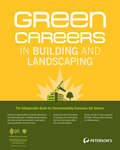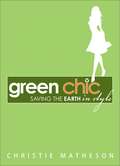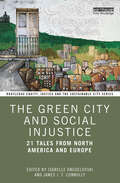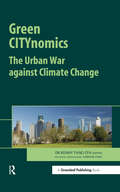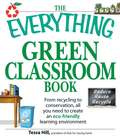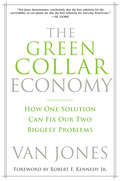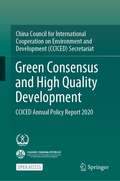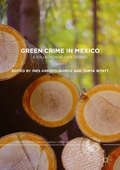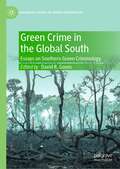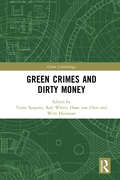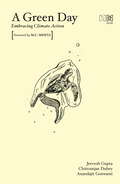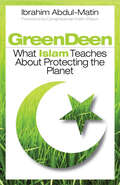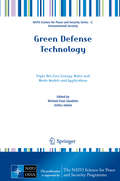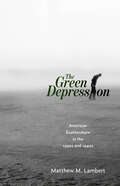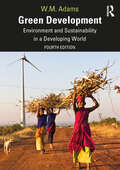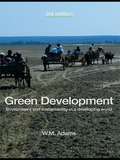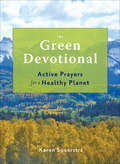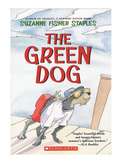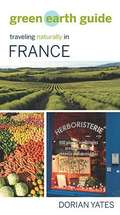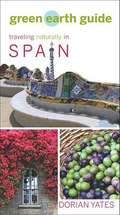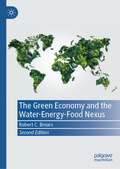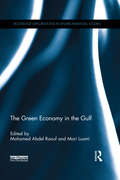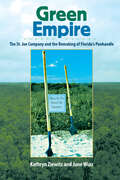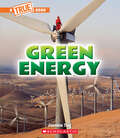- Table View
- List View
Green Careers in Building and Landscaping: Colleges and Union Organizations with Great Green Programs
by Peterson'sA listing of 25 four-year schools and 25 two-year schools that have great "green" programs. There is also a chapter on union training programs for green jobs. For more information see Peterson's Green Careers in Building and Landscaping.
Green Chic: Saving the Earth in Style
by Christie MathesonWant to go green without giving up great style? Not sure how to make changes--or why they matter? Welcome to the world of GREEN CHIC. Being green--thoughtfully, consciously green--makes a real difference in the fight against global warming. But did you know that it's also hip, classic, and stylish? --Look gorgeous --Love your wardrobe --Feel amazing --Travel in style --Create a home that's an oasis --Host fun parties --Eat incredible food and drink phenomenal wine --Feel more connected to your friends, family, and nature. (And did we mention that green women don't get fat?) Offering up dozens of author-tested, earth-friendly ideas, lifestyle writer Christie Matheson reveals that being chic and saving the planet aren't mutually exclusive. Can living a chic green lifestyle TRULY makes a difference? You bet your organic sheets it can. It's a calmer, more relaxed, more fabulous path that's about quality and quality of life. Embrace the fabulousness of green living. Being green isn't a fad--it's timelessly chic.
The Green City and Social Injustice: 21 Tales from North America and Europe (Routledge Equity, Justice and the Sustainable City series)
by Isabelle Anguelovski and James J. T. ConnollyThe Green City and Social Injustice examines the recent urban environmental trajectory of 21 cities in Europe and North America over a 20-year period. It analyses the circumstances under which greening interventions can create a new set of inequalities for socially vulnerable residents while also failing to eliminate other environmental risks and impacts. Based on fieldwork in ten countries and on the analysis of core planning, policy and activist documents and data, the book offers a critical view of the growing green planning orthodoxy in the Global North. It highlights the entanglements of this tenet with neoliberal municipal policies including budget cuts for community initiatives, long-term green spaces and housing for the most fragile residents; and the focus on large-scale urban redevelopment and high-end real estate investment. It also discusses hopeful experiences from cities where urban greening has long been accompanied by social equity policies or managed by community groups organizing around environmental justice goals and strategies. The book examines how displacement and gentrification in the context of greening are not only physical but also socio-cultural, creating new forms of social erasure and trauma for vulnerable residents. Its breadth and diversity allow students, scholars and researchers to debunk the often-depoliticized branding and selling of green cities and reinsert core equity and justice issues into green city planning—a much-needed perspective. Building from this critical view, the book also shows how cities that prioritize equity in green access, in secure housing and in bold social policies can achieve both environmental and social gains for all.
Green CITYnomics: The Urban War against Climate Change
by Kenny Tang Lorraine TangToday, more than half of the world's population are living in cities that are now contributing 80% of global greenhouse gas emissions. They cover less than 3% of the earth's surface. And urbanization continues apace. With such a massive carbon footprint, it is vital that cities are part of the solution. Despite this, scarcely any consideration has been given to the potential impact of climate change on urban dwellers, especially in the developing countries and burgeoning megacities of Africa, Asia and Latin America, where a wide variety of environmental and development challenges are likely to further exacerbate their vulnerability to climatic effects. Green CITYnomics presents a rich set of contributions by a highly diverse group of 45 of the world's leading urban experts on climate change. In particular, it illustrates the desire some cities are already demonstrating in engaging in this war. Standing still is not an option. Budgets have to be fought for; minds have to be won over; old, untenable and unsustainable ideas and solutions must be challenged; green and sustainable solutions must be given the chance to develop and to prove themselves. Each of the cities and urban centres discussed – from Hong Kong to Dresden; from Mexico City to Qatar – are, in their own ways, heroes and examples to us all. This book provides a compelling manifesto for the world's cities in their "Urban War against Climate Change". It is essential reading for climate scientists, national and local policy-makers and scholars worldwide.
Green Classroom Book: From Recycling to Conversation, All You Need to Create an Eco-Friendly Learning Environment (The Everything®)
by Tessa HillThis book is the essential guide for teaching children about nature and environmental protection. This guide shows teachers how to incorporate “green” concepts into everyday lessons, activities, and field trips. Also included are ways to send the lesson home, with clear steps for teaching children how to make saving the earth a part of their daily lives. Features information on:The best ways to address issues like global warming and the disappearing rainforests Sustainable school suppliesEco-friendly fundraisingInspiring field trip ideas (from the local farm to the local landfill!)Innovative ways to reduce, reuse, and recycleTeachers, students, administrators, and parents will learn to take green practices from the classroom to the larger world outside. By using teacher-tested activities and the inspiring stories of real kids, this book will motivate teachers and their students to turn education into action.
The Green Collar Economy: How One Solution Can Fix Our Two Biggest Problems
by Van JonesNow revised and updated, Van Jones's provocative and cutting edge New York Times bestseller The Green Collar Economy delivers a viable plan for solving the two biggest issues facing the country today--the economy and the environment.
Green Consensus and High Quality Development: CCICED Annual Policy Report 2020
by CCICEDThis open access book is based on the research outputs of China Council for International Cooperation on Environment and Development (CCICED) in 2020. It covers major topics of Chinese and international attention regarding green development, such as climate, biodiversity, ocean, BRI, urbanization, sustainable production and consumption, technology, finance, value chain, and so on. It also looks at the progress of China’s environmental and development policies,and the impacts from CCICED. This is a highly informative and carefully presented book, providing insight for policy makers in environmental issues.
Green Crime in Mexico: A Collection Of Case Studies (Palgrave Studies In Green Criminology Ser.)
by Tanya Wyatt Ines Arroyo-QuirozThis collection is the first exploration into green crime in Mexico, offering a unique critique of the environmental problems facing Mexico today. Written by a diverse range of Mexican academics and practitioners from different career stages and various different disciplines, this edited volume exposes the corruption, power, and disregard for the environment through highly detailed and engaging case studies. The chapters are grouped into four categories: Environmental Degradation, Social and Environmental Justice, Wildlife Trafficking, and Non-compliance with Environmental Obligations, and are illuminated by rigorous original research. This book fills a substantial gap in knowledge about concerns that are important not only to the Mexican people and the wider region, but to anyone with an interest in the environmental issues facing the world today. To this end, the contributors hope to inspire other Mexicans to study and research green crimes as well as to influence scholars and practitioners across Central and South America who are facing similar environmental crises and challenges.
Green Crime in the Global South: Essays on Southern Green Criminology (Palgrave Studies in Green Criminology)
by David R. GoyesThis book presents a socio-criminological study of environmental crime in the global South. It gathers contributors from all the regions of the geographical global South (Africa, Asia, Oceania, and Latin America) to discuss instances of environmental crime and conflict. Overall, it seeks to further decolonise the knowledge production of green criminology. It considers the legacy of colonisation, North-South and the core-periphery divides in the production of environmental crime, the epistemological contributions of the marginalised, impoverished, and oppressed, and the unique contexts of the global South. This book has three sections: drivers of green crime in the global South; responses to environmental harm in the global South; and global dialogues about crime and destruction in the global South. The first two sections represent the breadth of the topics that green criminologists have historically studied but from unique perspectives. The third section explores ethical and decolonial ways for Southern green criminology to collaborate with Western academia. This book speaks to scholars in criminology, political ecology, decolonial theory, along with the many readers interested in the interactions between humans and nature.
Green Crimes and Dirty Money (Green Criminology)
by Toine Spapens, Rob White, Daan van Uhm and Wim HuismanEnvironmental crimes are primarily driven by financial motives. The combined financial value of illicit trade in protected wildlife, illegal logging and waste trafficking is estimated to come directly after counterfeiting, the narcotic drugs trade and illegal gambling. Logically, the proceeds of these crimes must also be laundered. Goods, however, are not the only money maker for environmental criminals. Corporations may also try to ‘save’ costs by not complying with environmental regulations and thus commit crimes of omission rather than commission. From an enforcement and compliance perspective focusing on the proceeds of crime may therefore be an effective strategy. This book brings together different perspectives on the financial aspects of environmental crime and harm from a green criminological viewpoint. It addresses the role of economic systems, the value of environmental performance for corporations, money laundering in the context of environmental crime, financial investigation and questions of regulation and penalties. Discussing these topics from the view of green criminology, sociology and governance, this book will be of great interest to all those concerned about the financial dimensions of crime and the environment.
A Green Day: Embracing Climate Action
by Jeevesh Gupta Chittranjan Dubey Anandajit GoswamiAn Engaging Compilation of Perspectives on Climate Activism The impassioned essays, noteworthy profiles and first-person narratives in this anthology champion grassroots and global environmental movements that have persuaded policymakers and mobilized communities to take note of the worsening state of the natural order. From the Global South to the Global North, change advocates and those experiencing the thick of the emergency revisit the tipping points in their activism journey, lay out harsh truths about the extent of damage caused and offer scalable solutions to combat the mounting crisis. Outlining their rage, despair, fears and hope for the future, the campaigners underscore that there may be reasons to be optimistic despite the dreary reality we find ourselves in. While calling for collective action, these wide-ranging, inspiring and urgent stories reflect a diverse landscape of climate activism and are enough evidence that a sea change is possible.
Green Deen: What Islam Teaches about Protecting the Planet
by Keith Ellison Ibrahim Abdul-Matin“The Earth is a mosque.” Muslims are compelled by their religion to praise the Creator and to care for their community. But what is not widely known is that there are deep and long-standing connections between Islamic teachings and environmentalism. In this groundbreaking book, Ibrahim Abdul-Matin draws on research, scripture, and interviews with Muslim Americans to trace Islam’s preoccupation with humankind’s collective role as stewards of the Earth. Abdul-Matin points out that the Prophet Muhammad declared that “the Earth is a mosque.” Deen means “path” or “way” in Arabic. Abdul-Matin offers dozens of examples of how Muslims can follow, and already are following, a Green Deen in four areas: “waste, watts (energy), water, and food.” At last, people of all beliefs can appreciate the gifts and contributions that Islam and Muslims bring to the environmental movement. “Ibrahim Abdul-Matin not only shows the myriad ways American Muslims are contributing to the resolution of the environmental crisis that threatens us all but also goes a long way toward humanizing the Muslim community by sharing with the reader the lives of so many extraordinary, talented, and visionary people.” —Imam Zaid Shakir, Zaytuna College, Berkeley, California. “Ibrahim blends his passion for a green economy, his love and understanding of faith, and a deep commitment to justice in this book.” —Van Jones, founder, Green for All. “At a moment when distortions of Islam are what feed most Americans, Ibrahim Abdul-Matin has done something both practical and inspiring. He persuades us that the imperiled environment is both common struggle and common ground for people who share, it turns out, more than simply God.” —John Hockenberry, Emmy-award-winning journalist, author of Moving Violations, and host of National Public Radio’s The Takeaway.
Green Defense Technology
by Michael Evan Goodsite Sirkku JuholaThis book focuses on the ways in which military installations and small cities can implement and integrate triple net planning and energy, water, and waste sustainability strategies into broad installation operational management, arrive at the best decision, create policy and communicate effectively to stakeholders. It explores current and emerging technologies, methods, and frameworks for energy conservation, efficiency, and renewable energy within the context of triple net zero implementation practice. Recognizing that the challenge extends beyond finding technological solutions to achieve triple net zero outcomes, the contributions also address the need for a systemic view in the planning phase, as well as adequate communication and policy measures and incentives.
The Green Depression: American Ecoliterature in the 1930s and 1940s
by Matthew M. LambertDust storms. Flooding. The fear of nuclear fallout. While literary critics associate authors of the 1930s and ’40s with leftist political and economic thought, they often ignore concern in the period’s literary and cultural works with major environmental crises. To fill this gap in scholarship, author Matthew M. Lambert argues that depression-era authors contributed to the development of modern environmentalist thought in a variety of ways. Writers of the time provided a better understanding of the devastating effects that humans can have on the environment. They also depicted the ecological and cultural value of nonhuman nature, including animal “predators” and “pests.” Finally, they laid the groundwork for “environmental justice” by focusing on the social effects of environmental exploitation. To show the reach of environmentalist thought during the period, the first three chapters of The Green Depression: American Ecoliterature in the 1930s and 1940s focus on different geographical landscapes, including the wild, rural, and urban. The fourth and final chapter shifts to debates over the social and environmental effects of technology during the period. In identifying modern environmental ideas and concerns in American literary and cultural works of the 1930s and ’40s, The Green Depression highlights the importance of depression-era literature in understanding the development of environmentalist thought over the twentieth century. This book also builds upon a growing body of scholarship in ecocriticism that describes the unique contributions African American and other nonwhite authors have made to the environmental justice movement and to our understanding of the natural world.
Green Development: Environment and Sustainability in a Developing World
by Bill AdamsThe concept of sustainability lies at the core of the challenge of environment and development, and the way governments, business and environmental groups respond to it. Green Development provides a clear and coherent analysis of sustainable development in both theory and practice. Green Development explores the origins and evolution of mainstream thinking about sustainable development and offers a critique of the ideas behind them. It draws a link between theory and practice by discussing the nature of the environmental degradation and the impacts of development. It argues that, ultimately, ‘green’ development has to be about political economy, about the distribution of power, and not about environmental quality. Its focus is strongly on the developing world. The fourth edition retains the broad structure of previous editions, but has been updated to reflect advances in ideas and changes in international policy. Greater attention has been given to the political ecology of development, and market-based and neoliberal environmentalism, and degrowth. This fully revised edition discusses: the origins of thinking about sustainability and sustainable development, and its evolution to the present day. the ideas that dominate mainstream sustainable development (including natural capital, the green economy, market environmentalism and ecological modernization). critiques of mainstream ideas and of neoliberal framings of sustainability, and alternative ideas about sustainability that challenge ‘business as usual’ thinking, such as arguments about limits to growth, and calls for degrowth. the dilemmas of sustainability in the context forests, desertification, food and faming, biodiversity conservation and dam construction. the challenge of policy choices about sustainability, particularly between reformist and radical responses to the contemporary global dilemmas. Green Development offers clear insights into the challenges of environmental sustain- ability, and social and economic development. It is unique in offering a synthesis of theoretical ideas on sustainability and in its coverage of the extensive literature on environment and development around the world. The book has proved its value to generations of students as an authoritative, thought-provoking and readable guide to the field of sustainable development.
Green Development: Environment and Sustainability in a Developing World
by W. M. AdamsThe concept of sustainability lies at the core of the challenge of environment and development and the way governments, business and environmental groups respond to it. Green Development provides a clear and coherent analysis of sustainable development in both theory and practice. This third edition retains the clear and powerful argument of previous editions, but has been updated to reflect advances in ideas and changes in international policy. Greater attention has been given to political ecology, environmental risk and the environmental impacts of development. This fully revised third edition discusses: the origins of thinking about sustainability and sustainable development and its evolution to the present day the ideas that dominate mainstream sustainable development (ecological modernization, market environmentalism and environmental economics) the nature and diversity of alternative ideas about sustainability that challenge 'business as usual' thinking (for example ecosocialism, ecofeminism, deep ecology and political ecology) the dilemmas of sustainability in the context of dryland degradation, deforestation, biodiversity conservation, dam construction and urban and industrial development the nature of policy choices about the environment and development strategies and between reformist and radical responses to the contemporary global dilemmas. Green Development offers clear insights into the challenges of environmental sustainability and social and economic development. It is unique in offering a synthesis of theoretical ideas on sustainability and in its coverage of the extensive literature on the environment and development around the world. This book has proved its value to generations of students as an authoritative, thought-provoking and readable guide to the field of sustainable development.
The Green Devotional: Active Prayers for a Healthy Planet
by Karen SpeerstraOur planet, our home, is in crisis plain and simple and this collection of quotes, poems, essays, and prayers will inspire all to actively reverse the man-made cause of global warming, stem the tide of environmental destruction, and reconnect to the good earth. Short essays of topical interest introduce each of the eight sections of this book, and the 250 voices inside, most of them contemporary, begin to harmonize together as they seem to call out for their own canonical structure -- one bounded by the ancient elements: Earth, Air, Fire, Water. This collection of voices is like a "green book of devotional hours," reminiscent of the Books of Hours medieval people used to hold in their palms. It was called "a cathedral in your hands. " And like that medieval book, The Green Devotionalreminds us that we are connected to something broader and wiser than ourselves.
The Green Dog: A Mostly True Story
by Suzanne Fisher StaplesMy very own dog... All Suzanne can think of is her dream dog --- black-and-tan, with long silky fur and deep chocolate eyes. So when the perfect dog shows up one day, she is overjoyed. But Jeff, the dog, has a nose for trouble, and keeping him will be more difficult than Suzanne ever imagined.
Green Earth Guide: Traveling Naturally in France
by Dorian Yatesgreen earth guide: traveling naturally in France is written for the twenty-first-century traveler with a conscience. The first in a series of ecologically minded travel books exploring Western Europe, Green Earth Guide approaches France with a focus on staying green, directing readers to the latest resources for local and organic foods, natural health care, ecological businesses, parks, organic vineyards, public transportation, and other places of interest. Written in a friendly, accessible style by th...
Green Earth Guide: Traveling Naturally in Spain
by Dorian YatesSurveys by the International Ecotourism Society reveal that more than three-quarters of American travelers feel it is important not to damage the environment they are visiting. Green Earth Guide: Traveling Naturally in Spain helps travelers to Spain accomplish that goal. Author Dorian Yates focuses exclusively on where to find things green and alternative in one of the world's most popular travel destinations: local and organic foods, natural health care, ecological businesses, organic vineyards, renewable energy, yoga and meditation centers, national parks, public transportation, and other green places and services of interest.Written in a friendly, accessible style with personal anecdotes, how-to travel tips, and practical information, this second book in the series is aimed at helping travelers leave a smaller footprint wherever they venture. The book rescues readers who are accustomed to a certain level of green consciousness at home but end up compromising their values on vacation. Author Yates shows how to make the most environmentally beneficial choices for basic needs--food, shelter, health, exercise--while enjoying sites of ecological, historical, and natural interest along the way.From the Trade Paperback edition.
The Green Economy and the Water-Energy-Food Nexus
by Robert C. BrearsThis book argues that a variety of policies will be required to create synergies between the water-energy-food nexus sectors while reducing trade-offs in the development of a green economy. Despite rising demand for water, energy and food globally, the governance of water-energy-food sectors has generally remained separate with limited attention placed on the interactions that exist between them. Brears provides readers with a series of in-depth case studies of leading cities, states, nations and regions of differing climates, lifestyles and income-levels from around the world that have implemented a variety of policy innovations to reduce water-energy-food nexus pressures and achieve green growth. The Green Economy and the Water-Energy-Food Nexus will be of interest to town and regional planners, resource conservation managers, policymakers, international companies and organisations interested in reducing water-energy-food nexus pressures, environmental NGOs, researchers, graduate and undergraduate students.
The Green Economy in the Gulf: Lessons From The Uae's State-led Energy Transition (Routledge Explorations in Environmental Studies)
by Mohamed Abdel Raouf Mari LuomiFilling a void in academic and policy-relevant literature on the topic of the green economy in the Arabian Gulf, this edited volume provides a multidisciplinary analysis of the key themes and challenges relating to the green economy in the region, including in the energy and water sectors and the urban environment, as well as with respect to cross-cutting issues, such as labour, intellectual property and South-South cooperation.Over the course of the book, academics and practitioners from various fields demonstrate why transitioning into a ‘green economy’ – a future economy based on environmental sustainability, social equity and improved well-being – is not an option but a necessity for the Gulf Cooperation Council (GCC) States. Through chapters covering key economic sectors and cross-cutting issues, the book examines the GCC states’ quest to align their economies and economic development with the imperatives of environmental sustainability and social welfare, and proposes a way forward, based on lessons learned from experiences in the region and beyond.This volume will be of great relevance to scholars and policy makers with an interest in environmental economics and policy.
The Green Edit: Easy tips for the eco-friendly traveller
by Juliet KinsmanExplore the world and satisfy your wanderlust in the most eco-friendly way.How can we lessen our impact on the world without giving up the things we love? This series of easy-to-follow guides show that positive change is possible without radical changes to your everyday life.Sustainable tourism doesn’t have to mean vowing to never take another flight or spending holidays camping in your back garden. This short expert guide from eco-travel journalist Juliet Kinsman, takes you through every step of planning your trip, from booking to boarding, and arms you with everything you need to know for a lower-impact getaway.Whether it's explaining how to know which plane to take (yes, some are greener than others) or how to avoid the mini toiletries trap; this book shows that you can save the planet and still live life to the full.
Green Empire: The St. Joe Company and the Remaking of Florida's Panhandle
by Kathryn Ziewitz June WiazSince the Great Depression, the St. Joe Company (formerly the St. Joe Paper Company) has been Florida's largest landowner, a forestry and transportation conglomerate whose influence has been commensurate with its holdings. The company owns nearly one million acres, mainly in northwestern Florida, where undeveloped coastal and riverside landscapes boast some of the state's most scenic and ecologically diverse areas. For 60 years, the company focused on growing trees, turning them into paper, and managing its ancillary businesses. In the late 1990s, the company shifted directions: it sold its paper mill, changed its name, and launched a concerted drive to turn its natural-resource assets into greater profits. Today the St. Joe Company is a critical and fiscally powerful force in the real-estate development of northwest Florida, with access to the most influential people in government. Based on hundreds of sources--including company executives, board members, and investors, as well as outside observers--this factual and balanced history describes the St. Joe Company from the days of its founders to the workings and dealings of its present-day heirs. For anyone concerned with land use and growth management, particularly those with an interest in Florida's fragile wildlife and natural resources, Green Empire will illuminate the issues surrounding the relationship between one of the most ambitious players in Florida's real-estate market and the state's last frontier.
Green Energy (A True Book (Relaunch))
by Jasmine TingEnvision a brighter future with this STEM-based subset of True Books.We use a lot of energy to power our lives = from our homes and cars to our tablets and handheld games. The challenge facing us today is finding sustainable energy methods that will ensure a green future. There are seven different types of green energy = and they are the only types that don't pollute our Earth. We have learned how to harness the power of the sun, wind, water, and Earth. And technological innovations have allowed us to put these alternative energies to work in our everyday lives. Green Energy will show you how.ABOUT THE SERIES:What would a green future look like? Will trains and airplanes be powered by the sun? Will we have homes that have zero impact on the environment? The most pressing challenge facing us today is how to ensure a healthy Earth for ourselves and future generations. This STEM-based set of A True Books introduces students to the engineering innovations that can help us reach those goals. Interesting information is presented in a fun, friendly way = and in the simplest terms possible = and will inspire kids to start envisioning and enacting a more sustainable future.
